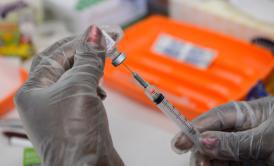One more reason for some legislators and parents to stop “raising concerns” about the link between a cervical cancer vaccine for young women and teen promiscuity: a new study has found that the link doesn’t exist.
The study, published Monday in Pediatrics, relied on medical records to look for “markers” of sexual activity in girls who were vaccinated against human papillomavirus, the leading cause of cervical cancer, at age 11 or 12, compared to those who were not. The study found very few instances of possible sexual activity by age 14 or 15 overall, and no difference in rates between the two groups of teens, comprised of a total of 1,400 girls, as CBS explains.
The HPV vaccine is recommended by the Centers for Disease Control and Prevention and the American Academy of Pediatrics for all children at age 11 or 12. The vaccination is generally delivered in three shots over six months and is intended to be administered well before the individual becomes sexually active. But because HPV can be sexually transmitted, some have reacted poorly to the idea of providing preventative treatment to a child for the virus. Because of this, state legislation intended to enforce the CDC recommendation has been met with controversy since 2006, when health officials first started recommending the vaccination.
For more on the underlying controversy, this piece from the Slate archives sums up the “promiscuity” argument nicely:
A cervical-cancer vaccination would “promote promiscuity” among teenage girls. Implicit in this argument is the assumption that good girls don’t get cervical cancer; only “loose” ones do—and they may get what they deserve. [in 2007], State Sen. George Runner of California told the Los Angeles Times that American money would be much better spent on other types of vaccines, since cervical cancer is a result of lifestyle choices, rather than bad genetic luck.
HPV is the most common sexually transmitted virus in the U.S. It has been linked to cervical, anal, and throat cancer. According to the New York Times, about a third of teenagers aged 14 to 19 have the virus.
